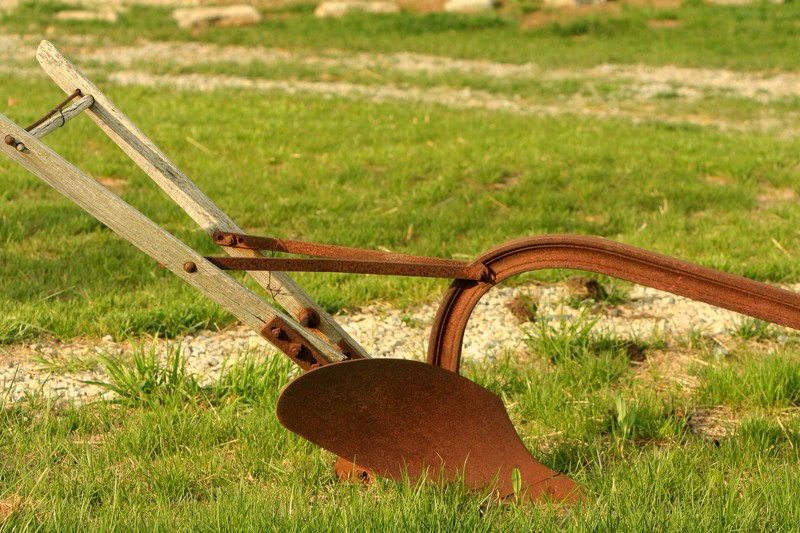
Plowshares Into Swords, Or Swords Into Plowshares?

What do you do when two verses are in obvious conflict with each other?
I’m not talking about apparent conflict or even factual inconsistencies but when one verse uses the exact same words to as another to say the completely opposite thing? As if one is saying, “No, that’s wrong, here’s what is really going to happen.”
At the beginning of Isaiah the prophet gives a beautiful image of a hopeful future, not only for Jerusalem and the people of Judah, but for the whole known world (emphasis mine):
He shall judge between the nations, and shall arbitrate for many peoples; they shall beat their swords into plowshares, and their spears into pruning hooks; nation shall not lift up sword against nation, neither shall they learn war any more. (Isaiah 2:4)
Micah actually quotes this verse (Micah 4:3)—or maybe Isaiah quotes Micah; Isaiah comes first in our Bibles not necessarily because it was written first but because it is a larger scroll than the relatively brief book of Micah.
Either way, Isaiah and Micah are on the same page.
The prophet Joel, however, is on a completely different page (again, emphasis mine):
Proclaim this among the nations: Prepare war, stir up the warriors. Let all the soldiers draw near, let them come up. Beat your plowshares into swords, and your pruning hooks into spears; let the weakling say, “I am a warrior.” (Joel 3:9-10)
The first thing to look at when interpreting small portions of scripture is the fuller context, but that is really no help here. All three passages deal with what came to be called the Day of the Lord, when God would judge all the nations—including Israel—and set the world to rights.
Reconciling the Differences
Some commentators try to reconcile the differences between the prophets by asserting that Isaiah/Micah and Joel are addressing two different historical contexts. Isaiah and Micah, they say, are addressing ultimate conditions in the future while Joel is addressing penultimate conditions.
In other words, on the Day of the Lord, the nations first wage war on each other, and Judah defeats all its enemies. Then everyone beats their swords into plowshares.
You no longer need swords when all your enemies have been defeated and are either dead or are subjugated to the Lord and His chosen people.
But that is not what is happening here. Isaiah/Micah and Joel are actually offering two different and competing visions of how a peaceful future will be attained.
Peace Through War and Conquest
Joel’s vision is no different from that of practically every nation on earth: peace will be attained when we defeat and subjugate all our enemies.
But a peace won by the sword has to be maintained by the sword; that is why Joel does not follow up his prophecy by saying that afterwards they won’t need their swords and can beat them into plowshares.
You’ll always need both plowshares and swords.
Peace Through Justice
Isaiah/Micah offer a different vision, and it is at odds not just with Joel but with most of the world. In this vision God’s people win the peace when they repent of their idolatry and their injustice—including the injustices that are done when seeking peace through violence—and turn to the Lord.
It’s really hard to date the writing of these three prophets but Isaiah and Micah were written no earlier than the 7th century B.C., while Joel was written as early as the 9th century B.C.
So perhaps it was prophets like Joel that Micah had in mind when he wrote, “Thus says the LORD concerning the prophets who lead my people astray, who cry ‘Peace’ when they have something to eat, but declare war against those who put nothing into their mouths.” (Micah 3:5)
A Higher Vision
Certainly it is Isaiah and Micah who give us a higher vision of both the future and our actions in the present. Nowhere in Joel do we find the soaring ethical insight of Micah: “He has told you, O mortal, what is good; and what does the LORD require of you but to do justice, and to love kindness, and to walk humbly with your God?” (Micah 6:8)
It’s significant that, while Jesus quotes Isaiah extensively, he never quotes Joel.
It’s clear which vision Jesus adopts.
Which makes it clear which we should as well.
Photo Credit: © Can Stock Photo / Carbonbrain
 I am a lifelong student of the Bible, and have been a pastor for over twenty-five years. My desire through this blog is to help people see things in the intersection of Scripture and real life that they might have missed. The careless handling of the Bible is causing a lot of problems in our churches and our culture--and is literally turning people away from the church, and, sometimes, God. I hope to treat Scripture with the respect it deserves, and, even if you don't agree with what I say, give you some insight.
Feel free to leave a comment. I promise to respond to you. All I ask is that you be respectful in your comments.
I am a lifelong student of the Bible, and have been a pastor for over twenty-five years. My desire through this blog is to help people see things in the intersection of Scripture and real life that they might have missed. The careless handling of the Bible is causing a lot of problems in our churches and our culture--and is literally turning people away from the church, and, sometimes, God. I hope to treat Scripture with the respect it deserves, and, even if you don't agree with what I say, give you some insight.
Feel free to leave a comment. I promise to respond to you. All I ask is that you be respectful in your comments. 
Connect with Me